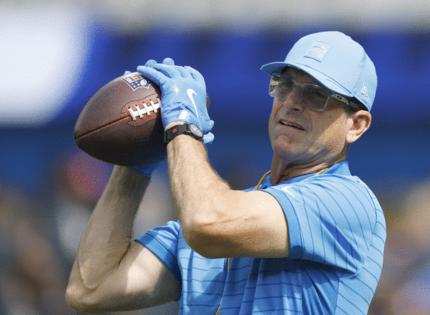Adam Minter: Jim Harbaugh is an even bigger PR headache for the NFL now
Published in Op Eds
The National Collegiate Athletic Association levied millions of dollars in fines against the University of Michigan for the sign-stealing scandal that took place under former head football coach Jim Harbaugh. The school will appeal, but even if it succeeds, the taint of the well-documented controversy will remain for years.
That’s no problem for Harbaugh. He’s now the head coach of the National Football League’s Los Angeles Chargers, where he earns a reported $16 million per year. It’s a lucrative asylum far beyond the reach of the NCAA.
But that makes Harbaugh the NFL’s problem, and it’s one the league doesn’t need.
The NFL’s integrity is under scrutiny like never before, particularly because of the growth of gambling. Any problem or scandal — from officiating blunders to conflicts of interest — can quickly spiral into a viral reputational crisis. Harbaugh, safely ensconced in Los Angeles, is that kind of hazard.
The details of Michigan’s sign-stealing were well-known before the NCAA released its findings on Friday. Starting in 2021 (and possibly earlier), individuals connected with the football team began attending the games of rivals in order to record and decipher play signals. Under NCAA rules, in-person scouting is prohibited. It’s an anachronistic rule, as I wrote in 2023. But it is a rule nonetheless, and Harbaugh’s staff repeatedly violated it until they were caught in 2023.
Over the course of the NCAA’s report, one thing becomes abundantly clear: Harbaugh doesn’t like the NCAA’s rules and the people who enforce them. During the years covered by the investigation, he sought to thwart both. The consequences are stark. “Based on Harbaugh’s indifference to compliance, his staff actively engaged in violations,” the NCAA writes. “The football program saw the compliance office as the enemy.”
The violations went beyond in-person scouting. They included earlier recruiting infractions, such as impermissible meetings with recruits during the pandemic and efforts to mislead investigators (which Harbaugh denied despite evidence to the contrary). The sign-stealing cover-ups by his staff — including one person who tossed an incriminating phone into a pond — also reveal a clear pattern of misconduct.
Harbaugh has long denied knowledge of the sign-stealing scheme, refused to accept responsibility for any aspect of the fallout, and has no intention of assuming any accountability. Indeed, as the controversy played out, he had an exit waiting for him: Several NFL teams and numerous observers viewed him as a highly desirable professional NFL coaching candidate. That status was fueled, in part, by his earlier winning tenure as coach of the San Francisco 49ers in the 2010s, his excellent record in Michigan, and the cynical (but correct) belief that the NCAA couldn’t touch him if he was out of college ball. Why wouldn’t he leave?
Sure enough, two weeks after he led the Wolverines to the 2024 national championship, he resigned and took the Chargers job. The team, and the NFL, appeared to be unbothered by the Big Ten conference’s findings that Michigan had engaged in “pervasive” and “systemic” rule breaking and ongoing NCAA investigations into its conduct.
Friday’s announcement that Harbaugh will be effectively banned from college football until 2038 (the year he turns 75) doesn’t seem to have heightened the sense of alarm. The league hasn’t issued a comment on the penalty, or responded to media inquiries (including mine) about it.
Indifference is a mistake. Despite its status as the most popular and lucrative of American sports leagues, the NFL is facing growing skepticism of its integrity from a restive fanbase and the media. As fans become financially invested in the outcomes of games, they understandably demand an on-field product that’s perceived as fair and unbiased.
That’s not what growing numbers of football lovers believe they’re getting, however. For example, frustration over subpar officiating has — with the assistance of social media — metastasized into full-blown conspiracies suggesting referee (and league) bias in favor of the Kansas City Chiefs. Think I’m exaggerating? Consider the run-up to the 2025 Super Bowl; in the days before the game, the unsupported theories were so popular that NFL commissioner Roger Goodell was forced to address them.
Harboring a coach who is effectively banned from coaching in college for the rest of his professional life doesn’t help the image. Harbaugh and his past don’t suggest a league that’s invested in upholding rules.
Meanwhile, teams are invoking the scandal to taunt him, something they’ll do for as long as he’s an NFL head coach. Though he’s done nothing wrong at the NFL level, he’s destined to be the league’s poster boy for cheating if and when the next controversy happens.
Goodell has faced this problem before. In 2011, he upheld a five-game NCAA suspension of Terrelle Pryor, an Ohio State linebacker who bolted for the NFL before he could serve out a similar penalty at the college level. At the time, Goodell said that it reflects poorly on the NFL when the league becomes “a sanctuary where a player cannot only avoid the consequences of his conduct, but be paid for doing so.”
That’s as true today as it was 14 years ago. And it’s why, if the league is serious about maintaining its credibility with fans, it will finally say — and perhaps do — something about Jim Harbaugh. If college football won’t tolerate his misconduct, why should the NFL?
_____
This column reflects the personal views of the author and does not necessarily reflect the opinion of the editorial board or Bloomberg LP and its owners.
Adam Minter is a Bloomberg Opinion columnist covering the business of sports. He is the author, most recently, of “Secondhand: Travels in the New Global Garage Sale."
_____
©2025 Bloomberg L.P. Visit bloomberg.com/opinion. Distributed by Tribune Content Agency, LLC.
























































Comments